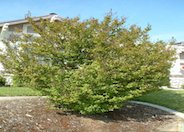
Common name:Crape Myrtle
Botanical name:Lagerstroemia indica
The new leaves of this species are 2" long, bright green, and tinged with bronze. Its fall color is affected by the weather. While it has a bare outline, its rounded seed capsules add interest. Its delicate flowers bloom in 6"-12" long clusters. The colors of its flowers are shades of red, rose, pink, purple, and white. It thrives on heat and new cultivars have been created that resist mildew.
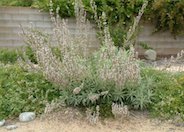
Common name:White Sage, Sacred White Sage
Botanical name:Salvia apiana
This woody shrub has long stems with silvery white leaves and fragrant white flowers that bloom in the spring. It provides a strong structural form as a garden focal point. It can reach 6' tall and 6' wide.
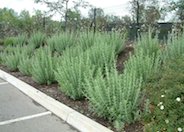
Common name:Azure or Russian Sage
Botanical name:Perovskia X atriplicifolia
This broad perennial will grow 3'-6' tall and has small, gray green leaves with blue violet flowers that bloom in the summer.
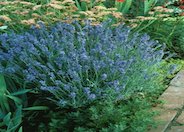
Common name:Lavender Lady English Lavender
Botanical name:Lavandula angustifolia 'Lady'
A well-developed woody base is apparent with this evergreen subshrub. Its leaves assume an obtuse form, and have a gray green color above and a white woolly shade below. It needs little water, full sun, and well drained soils. Strong lavender scent is used for perfumes and sachets.
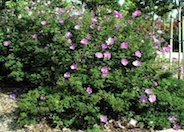
Common name:Blue Hibiscus
Botanical name:Alyogyne huegelii
This round shrub will grow about 6' tall by 6' wide and has medium-sized green leaves with lavender blue flowers that bloom all year.
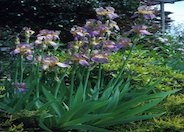
Common name:Bearded Iris
Botanical name:Iris Bearded Hybrids
This perennial will grow 1'-3' tall and has medium sized, blue green leaves with flowers of different colors that bloom in spring. It needs well draining soil and full sun. Many are fragrant and rebloom several times a year. Plant rhizomes in Sept or Oct. They need water once a week during the hot spells. Top dress with compost and gypsum in January and August.
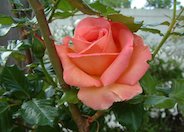
Common name:Hybrid Tea Rose (selections)
Botanical name:Rosa Hybrid Tea varieties
These shrubs and vines are the most loved in the Western USA and are very resilient. They come in a wide variety of sizes and colors and are easy to maintain with proper care. They can be used in a water-conserving garden with careful attention to irrigation practices.
| Designer: | Three Step Entry |
Photographer: GardenSoft |
Soils and Compost:
Incorporate compost 6" into your soil to retain water, reduce compaction, feed earthworms, and provide valuable nutrients to your plants.
Water Saving Tip:
Adjust sprinklers to avoid watering sidewalks and driveways.
Integrated Pest Management:
Develop healthy soil for plants that are vigorous and naturally pest-resistant.

